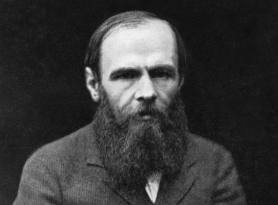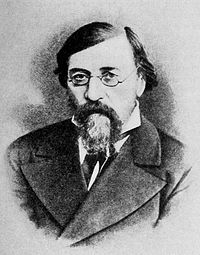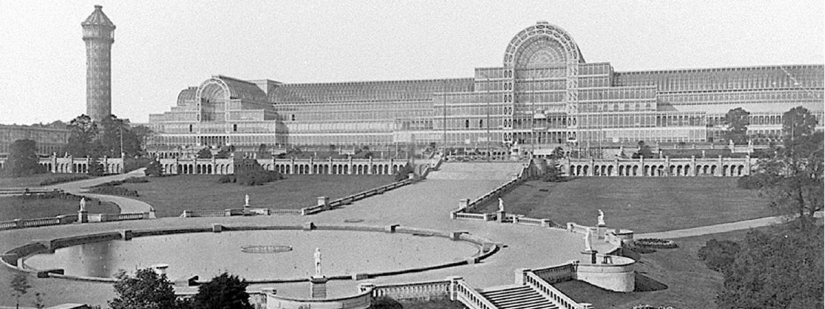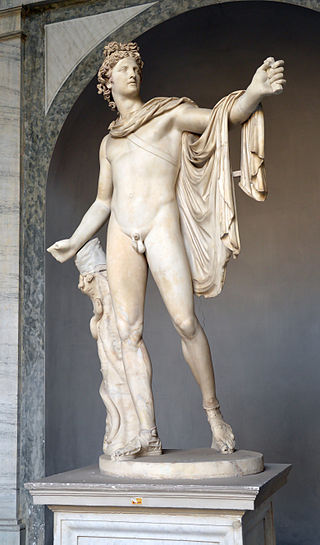As a big fan of Russian literature (who isn’t?), and Dostoevsky himself, I love reading and writing about the details of his work. Strangely, however, something that seemed fairly obvious to me, was lacking in research and academic discussion. The link between the Underground Man and the struggle with reason is either; a figment of my imagination, in which case – sorry to have bothered you, or totally and unapologetically not covered by scholars. Either way, I hope to have formed a compelling argument in what follows. For those who have a copy of ‘Notes from Underground’, it might be worth having it to hand while you read this, and the link I’ve made should hopefully become apparent. For those who don’t own a copy, you really should. Go and get one. It’s a great introduction to the work of, in my opinion, one of the world’s greatest authors.
The charge of an attack on the principles of rational egoism has been brought to ‘Notes from Underground’ (hereafter NFU) by many scholars (Peace, 1971, p.8; Scanlon, 1999; Roberts, 2012, p.205; Roberts, 2013, p.397). They claim that after visiting various cities Dostoevsky observed, and became frustrated by, the rise of individualism, which has a crucial role in rational egoism’s central tenet; that an action is rational if it maximizes “one’s self-interest” (Shaver, 2015). Whilst it has been well argued that the unnamed protagonist in NFU rejects this particular branch of rationality, most research has, somewhat conspicuously, overlooked the arguably more abstract notion of post-Enlightenment reason. Post-Enlightenment reason, I argue, can be understood in Kantian terms, as possessing the “courage to use your own understanding”, or to think for oneself, without guidance from another (Kant, 1999, p.1). Other post-Enlightenment values include inclinations towards science, reason and logic, in accordance with the ideological shift away from religion that took place during the Enlightenment period. Namli (2009, p.200) has discussed how the main character of ‘Notes from Underground’, hereafter the Underground Man, struggles with Kantian reason, however this discussion is primarily about how the Underground Man views moral questions, and seems to conflate the position of the Underground Man with that of Dostoevsky. I will demonstrate that the Underground Man’s struggle with reason is conveyed through the style and content of the novella, without appealing to the authors personal beliefs. The Underground Man uses symbolic devices and an unorthodox structure to convey the nature of his struggle, and that it is ongoing. I argue that the Underground Man’s struggle with reason is complex, endless, and goes beyond mere rejection.

From the beginning of part one the reader is introduced to “the gentlemen” (Dostoevsky, 2001, p.3), to whom the Underground Man addresses his notes, and who seemingly rebut his objections to rational thought. Scholars have postulated that the gentlemen are representative of Chernyshevsky and other followers of rational egoism (Scanlan, 1999, p.551; Roberts, 2013, p.397), although this claim requires a much deeper textual analysis than is required to establish their symbolism of Kantian reason. Within the first paragraph, the Underground Man tells the gentlemen that they “probably won’t understand” the reason he does not wish to visit a doctor and seek medical treatment (Dostoevsky, 2001, p.3). It transpires that the Underground Man does not seek treatment “out of spite”, and this is why he thinks that the gentlemen will not understand his motives; because they do not appeal to reason or science. In ‘What is Enlightenment?’ Kant states that “laziness and cowardice are the reasons why” many remain “immature for life”, and thereby easily guided by another (Kant, 1991, p.1), and although the Underground Man does not use either of these reasons for not seeking medical treatment, it is not difficult to imagine that he is lying to protect his pride, and that he is too lazy or too afraid to visit the doctor. This is especially true when considering the Underground Man “thinks things up for himself” so much so that “the reader becomes lost in a web of fiction” (Peace, 1971, p.15). The gentlemen are considered by the Underground Man to take a position of reason: if medicine will help to heal the liver, then one should seek medicinal treatment. The Underground man accepts the conditional premise, that medicine will help, but denies the consequent, that he should seek treatment, which does not follow the modus ponens that he implies the gentlemen adhere to. Importantly, the Underground Man does not reject logic, or say that it is wrong, only that he does not expect the gentleman qua the embodiment of reason and logic to understand him.
Furthermore, when the Underground Man addresses the gentlemen as though they will laugh and deride his idea that “man needs… his own independent desire” (Dostoevsky, 2001, p.19), they are also demonstrably representing reason. He imagines the gentlemen replying that desire does not exist, and science has come far enough to deconstruct man to better understand him to (Dostoevsky, 2001, p.19). The Underground Man initially stumbles in responding, before eventually conceding the possibility that, one day, scientists “really do discover the formula for all our desires” (Dostoevsky, 2001, p.19). However, if desires were “completely reconciled with reason” it would result in man not being able to desire what could be bad for him (Dostoevsky, 2001, p.20). Within this page, the reader observes the Underground Man formulating his thoughts, and realising that free will would be compromised if reason is applied fully. The Underground Man goes on to state that he would not only wish to satisfy his rational faculty, but all his faculties, and he expects the gentlemen to look at him with a pitying “compassion” (Dostoevsky, 2001 p.20). The Underground Man expects the gentlemen to pity him because he develops a suspicion of reason, and because he is “arguing the cause of human freedom against the restricting categories” of reason (Peace, 1971, p.10). This seems to show that the Underground Man considers the gentlemen to be looking at him as their inferior, they are imagined to be entirely arguing the case for reason, and he does not want to believe it. This is substantiated by Peace (1971, p.10) claiming that the Underground Man “refuses to accept something as humbling to his own ego as ‘laws of nature’ in the drafting of which he has had no part”. The Underground Man is selfish and proud, and it troubles him that he may not control his own destiny, and in this way, he struggles against the dictates of reason. The irony is that in desiring control of his own life, he is acting in accordance with Kantian reason – “using one’s own understanding without the guidance of another” (Kant, 1999, p.1). The Underground Man is rejecting what he considers to be the restricting conditions of reason, and can see no harmony or reconciliation between reason and his own free will. The two are, in fact, not mutually exclusive, as his actions demonstrate.

In the penultimate chapter of part one, the Underground Man begins to discuss “the crystal palace” (Dostoevsky, 2001, p.25), a representative device by which he continues to battle against Kantian reason. The attack on rational egoism is, reportedly, in reply to Chernyshevsky, and Peace (1971, p.8) argues that the crystal palace is also a borrowed representation from his work, in which it is a “symbol for [the] perfect society of the rationalists”. The Underground Man is openly fearful of the crystal palace, which suggests less of a rejection of the reason it symbolizes and more of a suspicion of it. He also wishes he could “stick one’s tongue out” at it (Dostoevsky, 2001, p.25), an act of mockery that is usually associated with infancy, or showing disapproval when a coherent argument is lacking. Here, the Underground Man shows that he is suspicious of reason, although can put forward no compelling argument and continues only to say that he has “rejected the crystal palace for the sole reason that it won’t be possible to tease it” (Dostoevsky, 2001, p.26). The reader gets a sense of the Underground Man as acting rather childish here, and it is striking that he seems to struggle in articulating his objection to the crystal palace, similar to the way he struggles to straightforwardly reply to the gentlemen. Peace notes that the “very ‘perfection’ of the crystal palace is in itself a mark of its non-human quality” (1971, p.9), and in his previous dialectic with the gentlemen the Underground Man has already demonstrated his support of “human freedom”; to choose what is not good for himself, over the “restricting categories” of reason (1971, p.10). The Underground Man chooses the power of human will over “the total elimination of the personality” (Frank, 2001, p.229) that the crystal palace represents. Indeed, the crystal palace, “stands… for the triumph of man’s reason” (Peace, 1971, p.9) and the Underground Man takes this triumph to mean how man can understand all of creation in precise “tables of logarithms” (Dostoevsky, 2001, p.18), to which he fervently objects.
If Haltresht is correct in claiming that the mice and rats in the Underground Man’s dwelling symbolise his “inner life” (1974, p.60) then the reader can consider the crystal palace to be the antithesis of the Underground Man’s “corner”, which is described as “nasty [and] squalid” (Dostoevsky, 2001, p.5), and “[his] disgusting, stinking underground” (Dostoevsky, 2001, p.9). It would begin to make sense, then, to say the Underground Man “secretly yearns for the crystal palace – for rationality” (Haltresht, 1974, p.64): he craves the culture and the reason, the purity and cleanliness, the “goodness and happiness” that the crystal palace represents, but because of his pride he cannot admit this. Instead, like a child, he only wants to mock the crystal palace while recoiling back into his corner

As the reader moves into part two of ‘Notes from Underground’, the atypical format of the text becomes much more pronounced, and it is striking that the novella jumps back some sixteen years, to when the Underground Man was twenty-four. This abnormal chronology adds to what Roberts calls a “jarring and difficult” structure (2013, p.405), and after having adjusted to the “philosophical rant” of part one (Roberts, 2013, p.397), the reader must adjust their approach to the novella as they are faced with a more typical narrative style. This unconventional style of setting out his memoirs seems to be blow to order, in favour of chaos, from the Underground Man. This is another example of the Underground Man adhering to his own principles, utilizing his own style in favour of guidance from other authors, and “continuing boldly on [his] way” (Kant, 2009, p.2). Roberts (2013, p.212) notes that whilst the structure is “unusual”, Dostoevsky deliberately made part two constitute an explanatory majority of the novella, and this makes for an “organic whole”, viz, a natural progression in the text that could have otherwise become disjointed by such a chronological jump. This provides a sense of “cohesion, consistency and wholeness” (Bakhtin, 1984, p.8) typical of Dostoevsky’s work. This is, perhaps, where the amalgamation of author and protagonist is unavoidable: Dostoevsky’s idiosyncrasy in writing style reflects the Underground Man’s nihilism. Notably, Matlaw (2001, p.175) claims that the “complex series of psychological and social motivations”, evident in the second part, necessitate “the philosophical position enunciated in the first part”, meaning that the narrator has trapped the reader in an infinite cycle, the second part follows the first, which follows from the second, and so on ad infinitum. In virtue of the structure, “there is no escape” from the Underground Man’s way of being, thinking or acting (Matlaw, 2001, p.177). This, along with Dostoevsky’s concluding admission that the memoirs “don’t end here” (2001, p.91) shows that the Underground Man’s battle with reason continues indefinitely, making reconciliation (from the narrator’s viewpoint) impossible.
Perhaps the most obvious, yet most conspicuously overlooked symbol of the Underground Man’s struggle with reason is his servant, Apollon. Before examining the formers interaction with the latter, the importance of Apollon’s name should be established, and this is best done with reference to Nietzsche’s ‘The Birth of Tragedy’ which may have been influenced by the struggle with reason. Apollon is very similar, at least by name, to Apollo, the Greek god described by Nietzsche as “the deity of light” (Nietzsche, 1993, p.16), who represents reason and logic. Opposite Apollo is Dionysus, the Greek god who represents, inter alia, emotion. The “duality” of these two deities, according to Nietzsche, engenders the “continuous development” of art (Nietzsche, 1993, p.14).

Furthermore, it is known that Nietzsche felt he could learn from Dostoevsky’s work. This may seem tangential, unless the reader can (not altogether unjustifiably) imagine the servant Apollon representing the deity Apollo, symbolizing reason and logic. The interaction between the Underground Man and Apollon in the final stages can then be viewed very differently. Not only does the Underground Man label Apollon his “executioner” (Dostoevsky, 2001, p.81), suggesting that reason will be the death of him (which could also refer to the death of his ideals, so heavily opposed to reason), but Apollon is depicted as, rather calmly, being the voice of reason: he tells the Underground Man “you’re really not in your right mind” to suggest Apollon calls the police on himself (Dostoevsky, 2001, p.82). In this scene, the Underground Man’s speech is punctuated by exclamation marks, suggesting emphatic, Dionysiac emotion as he “screeche[s]” at Apollon to leave (Dostoevsky, 2001, p.82). Strikingly, he orders Apollon to leave immediately before Liza arrives, which is symbolic of the absence of reason in their final interaction. Certainly, the Underground Man acts irrationally, and it seems he is unsure of his own thoughts and actions as he rushes “back and forth across the room” (Dostoevsky, 2001, p.89). Once Liza has gone, the Underground Man admits that he feels “horribly oppressed” (Dostoevsky, 2001, p.89); it seems to be the case that without reason present, he acts in a way that he does not understand. Without reason, or Apollon, he shows a “lack of resolution and courage” (Kant, 1991, p.1) and cannot think for himself. The Underground Man has been waiting for Liza for days, but without reason he acts in a way that conflicts with what he really wants. This final scene accurately depicts the Underground Man’s battle with reason; he does not want to live his life with it and tries to banish it, yet in so doing he makes a fool of himself and lacks the conviction to say what he genuinely feels. The Underground Man needs reason to thrive, but he can only imagine it to hinder him.
In deploying the various devices discussed, the Underground Man imbues his literary memoirs with his own philosophy. In contrast to Namli (2009), I believe it is demonstrated that the Underground Man does not formally reject Kantian reason, but that he cannot properly formulate an objection to it, as shown in his juvenile dealing with the crystal palace. The Underground Man does not understand, nor realise, that he acts in accordance with reason when arguing against the gentlemen, and this is “the paradox of reason being denied… by the only tool which will adequately do so – reason itself”, perfectly justifying Dostoevsky’s label for him as the “paradoxalist” (Matlaw, 2001, p.176). This final word on the narrator, and the infinity of the structure, shows that the Underground Man is condemned to this endless struggle. He will, in a manner representational of the Dionysiac, forever battle with reason and its representation in Apollon. If Nietzsche is to be believed, this will, through the artful form of the novella, depict the true tragedy of his struggle.
Suggested Reading:
Bakhtin, M. (1984). Problems of Dostoevsky’s Poetics. Manchester, Manchester University Press.
Dostoevsky, F. (2001). Winter Notes on Summer Impressions. In: Katz, M. R. (ed.) Notes from Underground. 2nd ed. New York, W. W. Norton & Company, Inc. pp. 99-101.
Dostoevsky, F. (2001). Notes from Underground. In: Katz, M. R. (ed.) Notes from Underground. 2nd ed. New York, W. W. Norton & Company, Inc. pp. 1-93.
Frank, J. (2001). Notes from Underground. In: Katz, M. R. (ed.) Notes from Underground. 2nd ed. New York, W. W. Norton & Company, Inc. pp. 213-250.
Haltresht, M. (1974). Symbolism of Rats and Mice in Dostoevsky’s “Notes from Underground”. South Atlantic Bulletin. 39(4), pp. 60-62.
Kant, I. (1991). An Answer to the Question: ‘What is Enlightenment?’. London, Penguin Books Ltd.
Matlaw, R. E. (2001). Structure and Integration in Notes from the Underground. In: Katz, M. R. (ed.) Notes from Underground. 2nd ed. New York, W. W. Norton & Company, Inc. pp. 162-178.
Namli, E. (2009). Struggling with reason: Dostoevsky as moral theologian. Studia Theologica. 63, pp. 197-216.
Nietzsche, F. (1993). The Birth of Tragedy. London, Penguin Books Ltd.
Peace, R. (1971). Dostoyevsky: An Examination of the Major Novels. London, Cambridge University Press.
Roberts, P. (2012). Education and the Limits of Reason: Reading Dostoevsky. Educational Theory. 62(2), pp. 203-223.
Roberts, P. (2013). The Stranger Within: Dostoevsky’s Underground. Educational Philosophy and Theory. 45(4), pp. 396-408.
Scanlan, J. P. (1999). The Case against Rational Egoism in Dostoevsky’s “Notes from Underground”. Journal of the History of Ideas. 60(3), pp. 549-567.
Shaver, R. (2015). Egoism. Available from: https://plato.stanford.edu/entries/egoism/#3 [Accessed 2nd January 2017].



👍🏻
LikeLike